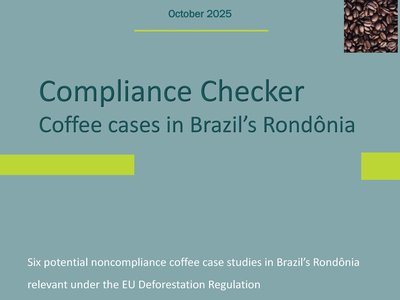October 22, 2025 - Coffee Watch, the global watchdog organization dedicated to reforming the coffee industry, and AidEnvironment, release the second of a series of deforestation risk profiles.
This coffee risk profile of Brazil’s coffee production state Rondônia is part of a series of reports on key commodities’ producing, trading, and buyer regions and companies that will serve as input for AidEnvironment’s Compliance Checker, an interactive case studies’ Dashboard. This sustainability risk profile of Amazon state Rondônia, Brazil’s 5th largest coffee producing state and 2nd largest producer of robusta coffee, analyses potential noncompliance case studies in the scope of the EU regulation on deforestation-free products (EUDR).
The analysis maps Rondônia’s main coffee sourcing areas, its link to deforestation hotspots, and the location of assets and infrastructure linked to robusta coffee imports into the European market. A key element of the report is the demonstration of six case studies of coffee farms with likely forest clearing since the EUDR cut-off date, that might be noncompliant with the EUDR if the coffee beans produced on the cleared plots would enter the EU market when the law enters effect.
This new report reveals limited recent deforestation linked to coffee in Rondônia, with only 0.57% of coffee areas established after the EU Deforestation Regulation (EUDR) cut-off date. Most coffee is grown on former cattle pastures, suggesting potential for deforestation-free expansion. However, small-scale forest clearing linked to coffee was found in a few municipalities, raising concerns amid growing Robusta exports and weakening state-level protections.
The report’s case studies have been shared with five coffee exporters (LDC, Olam, Sucafina, BlendCoffee, and NKG Stockler) for further engagement in July 2025.
Here are the company responses to six coffee Rondônia cases shared with LDC, NKG, Sucafina, Olam, and BlendCoffee in July 2025:
- LDC states that “all 12 CARs [cited in the six cases, ed.] are marked as non-EUDR-compliant in our database, thereby preventing any future coffee deliveries from these entities to LDC”. An example EUDR Protocol Verification Report shared with AidEnvironment however reveals a few shortcomings in the due diligence process, see page 6 of this report.
- Sucafina states they source from only one of the four coffee intermediaries indicated in the cases but does not disclose which one. Moreover, the company says that it “does not purchase coffee from any of the farms named in the report” and that “10 of the 12 failed our compliance filters. Two were deemed compliant based on public records and satellite imagery, but as they are not suppliers to Sucafina, no field visits were conducted”.
- NKG says that its “Brazilian export company NKG Stockler does not purchase coffee from the region Rondônia in general” and “has no business relations with the cooperative Caferon”. However, the company also states that while reviewing the importers, ”so far, we haven't found any links to the farms or the cooperative. However, due to the complexity of the supply chains, we can never completely rule out the possibility that coffee from these farms may have entered our supply chain through third party sales.”
- Olam states that it is not connected to any of the six coffee cases in Rondônia, but without providing further details.
- BlendCoffee did not reply after repeated requests.


